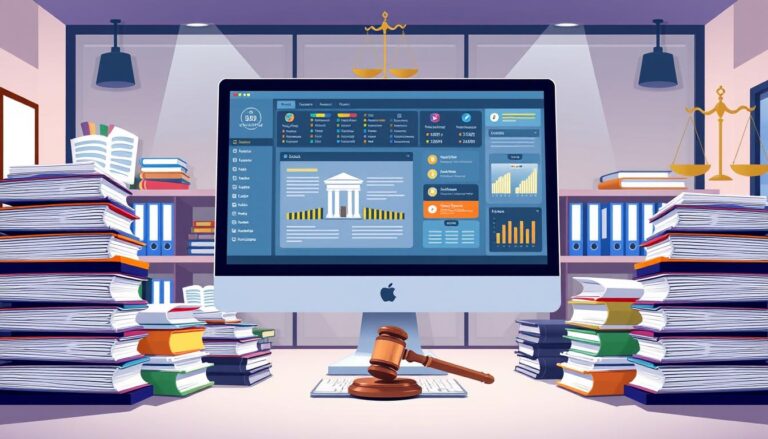Virtual Courtroom Etiquette and Best Practices
Ever thought about how to do well in online court hearings? Today, virtual courts are common, and lawyers need to learn new ways to act. What are the main rules and tips for being good in these online courts? Let’s dive into the essential guidelines and practices for a smooth and professional virtual courtroom experience.
Technical Requirements and Setup Essentials
Remote litigation practices are now key in the legal world. They help keep the digital courtroom running smoothly. Legal pros need to know the tech needs for virtual courts.
Internet Connection and Device Requirements
A strong internet connection is crucial for virtual court. Choose a high-speed internet, like Ethernet, to avoid problems. Also, make sure your computer or laptop can handle video calls and sharing files well.
Audio and Video Equipment Setup
Get a good headset or microphone for clear audio in virtual hearings. Test your gear before the hearing to fix any problems. Also, place your webcam so it shows your face at eye level for better interaction.
Software Installation and Updates
Learn how to use the court’s virtual platform, like Zoom or Microsoft Teams. Keep your software up to date for the latest features and security. Arrive 5-10 minutes early to check your connection and audio, fixing any issues before the hearing starts.
| Requirement | Recommendation |
|---|---|
| Internet Connection | High-speed wired Ethernet connection |
| Device | Computer or laptop with adequate processing power and memory |
| Audio | Quality headset or microphone |
| Video | Webcam positioned at eye level |
| Software | Latest version of virtual courtroom platform (e.g., Zoom, WebEx, Microsoft Teams) |
Following these tech tips helps legal pros have a smooth virtual court experience. It keeps the standards high for remote litigation, digital decorum, and e-court conduct.
Professional Appearance and Environment Preparation
The legal world is moving online, and it’s key for lawyers to act as professional as they would in a real courtroom. Wearing the right clothes, having a clean space, and looking sharp are all important for a virtual trial or online hearing.
When you’re in a virtual court, dress like you’re in a real one. Steer clear of casual clothes, like hats or sunglasses. Make sure your background is simple and free from distractions. Also, think about how you’re framed on camera.
It’s also important to keep your space distraction-free. Make sure your internet is strong and your tech works well. Position your camera right, and check your lighting and background to look professional.
By following these virtual trial etiquette and online hearing best practices, lawyers can show respect for the court and their clients, even online. This helps the court run smoothly and shows the lawyer’s dedication to their work.
| Recommended Practices | Prohibited Behaviors |
|---|---|
|
|
By sticking to these rules, lawyers can make sure their virtual courtroom is professional and free from distractions. This makes the experience better for everyone involved.
Virtual Courtroom Etiquette and Best Practices
The legal world has changed fast with the COVID-19 pandemic. Lawyers now need to adjust their courtroom manners and practices for virtual courts. It’s key to stay professional and follow virtual court rules for a smooth legal process.
Proper Addressing of Court Officials
In a virtual courtroom, it’s important to show respect to the judge and other officials. Just like in a real courtroom, use your full name when signing in. Always call the judge “Your Honor” or “Judge [Last Name].”
Speaking and Participation Protocol
For a well-run virtual courtroom, keep your mic muted until it’s your turn. Speak clearly and briefly, and don’t interrupt. To ask to speak, raise your hand or use a gesture, just as you would in person.
Document Handling in Virtual Settings
Handling documents in a virtual court needs extra care. Lawyers should know how to use screen sharing and Zoom tools to show documents clearly. They should also work with opposing counsel to share digital evidence smoothly.
Following these virtual courtroom etiquette tips helps lawyers keep the legal process strong. They can give top-notch service to their clients, even with the pandemic’s challenges.
“Adapting to the virtual courtroom requires a renewed focus on professionalism and attention to detail. Maintaining the same level of decorum and respect as in a physical courtroom is essential for ensuring a successful outcome.”
Security and Confidentiality Protocols
The legal world is changing fast with online court proceedings and legal technology. It’s key to focus on keeping things secure and private in the e-court conduct guidelines. The COVID-19 pandemic made virtual hearings a must, and courts need to keep these digital events safe and private.
First, make sure your devices are safe with the latest security updates and antivirus software. This simple step can help prevent unauthorized access or data breaches during virtual court sessions. Also, be careful when sharing screen content. Showing sensitive information by mistake could break the confidentiality of the proceedings.
- Respect any publication bans or restrictions in effect, as unauthorized recording or broadcasting of the proceedings may result in sanctions, including criminal prosecution or contempt of court.
- Avoid forwarding meeting invitations or sharing login credentials without explicit approval from the court, as this could jeopardize the security of the virtual courtroom.
By sticking to these security and confidentiality rules, legal pros and participants help make online court proceedings smooth and safe. This keeps the justice system strong in our digital world.
“Maintaining the confidentiality and security of virtual court proceedings is a paramount concern as we navigate the evolving landscape of legal technology.”
Document Management and Presentation Skills
The legal world is changing fast. Now, knowing how to manage and present digital documents in court is key. This skill helps keep the digital courtroom decorum, follows virtual trial etiquette, and makes strong arguments. It’s all about following online hearing best practices.
Screen Sharing Best Practices
Sharing documents clearly in virtual hearings is vital. Make sure all needed documents are ready before the hearing. Use your video platform’s screen-sharing to focus on important parts. Remember, the judge and others need to see it well.
Exhibit Organization Methods
Organizing digital exhibits well is important for a smooth presentation. Send organized materials to the judge early. This makes it easy for them to find what they need quickly. Use digital tools to highlight and annotate exhibits for better understanding.
Digital Evidence Presentation
Use your video platform’s features to present digital evidence well. Use tools to highlight important points and make sure everything is clear. Also, make sure all documents are easy to access and share, like through cloud storage.
By improving these document management and presentation skills, lawyers can confidently handle virtual court cases. These skills show technical ability and follow virtual trial etiquette. They are crucial in today’s changing legal world.
Communication Guidelines with Court Participants
The legal world is changing fast, and video conferencing for lawyers is now key. To talk well and keep things running smoothly in online court proceedings, follow some important rules. These rules help when you’re talking to everyone in the virtual courtroom.
First, talk to the other lawyer before any virtual hearings. Share any important documents and agree on how things will go. This makes things easier and avoids problems. When you’re in the virtual courtroom etiquette, speak clearly and not too fast. This helps everyone understand you better.
Use gestures or nods to show you’re done talking. This stops any mix-ups or interruptions. Also, tell the court right away if you have tech problems or need to leave for a bit.
- Coordinate with opposing counsel before virtual hearings to exchange exhibits and agree on procedures.
- Communicate clearly and concisely, speaking slower if necessary to account for audio delays.
- Use visual cues to indicate when you’ve finished speaking.
- Inform the court immediately if you encounter technical issues or need to step away briefly.
By following these tips, lawyers can handle the virtual courtroom well. This makes sure everyone has a professional and smooth experience.
| Best Practices for Virtual Courtroom Communication | Potential Challenges |
|---|---|
| Coordinate with opposing counsel before hearings | Lack of in-person interaction |
| Communicate clearly and concisely | Audio/video delays |
| Utilize visual cues | Technical difficulties |
| Inform the court of any issues | Maintaining professional etiquette |
“Effective communication is the key to success in virtual courtroom proceedings. By following these guidelines, lawyers can ensure a smooth and professional experience for all participants.”
Remember, getting used to video conferencing for lawyers and online court proceedings takes effort. But by sticking to these communication tips, you can handle the virtual world well. This helps you get the best results for your clients.
Handling Technical Difficulties and Backup Plans
In today’s world of remote courtrooms, tech problems can be a big challenge. But, with good planning and backup strategies, lawyers can handle these issues smoothly. It’s all about being ready for common tech problems and having a solid backup plan.
Common Technical Issues Solutions
Issues like internet drops or audio/video problems can pop up in virtual courts. The fix is to test everything well and know your tech inside out. Make sure your internet is strong and fast, and have a mobile hotspot ready. Also, keep your video conferencing tools updated and know how to fix them.
Emergency Backup Procedures
When tech fails, it can mess up your plans. To keep things running smoothly, have a detailed backup plan. Have a backup device, like a phone, ready with the right apps. Try joining the court from two devices to be extra safe. And, have the court’s contact info handy for big tech issues.
By tackling common tech problems and having strong backup plans, lawyers can confidently handle virtual courts. This ensures remote court work keeps going without a hitch.
| Common Technical Issues | Solutions |
|---|---|
| Unstable Internet Connection | Use a mobile hotspot as a backup |
| Audio or Video Malfunctions | Troubleshoot software features, update devices |
| Software Compatibility Issues | Ensure all participants use compatible platforms |
“Preparation is the key to success in any virtual court proceeding. By anticipating and addressing potential technical difficulties, legal professionals can maintain digital courtroom decorum and continue remote litigation practices seamlessly.”
Virtual Witness Examination Techniques
Virtual trials and hearings are now common due to the COVID-19 pandemic. Lawyers need to change how they question witnesses online. They should be ready to share important documents quickly to challenge witnesses.
It’s also important to watch for small cues in the video window. These can show how a witness feels, even if it’s hard to see.
Lawyers must ask questions clearly and briefly. This is because video calls can sometimes delay audio. They should also make sure witnesses know what to do and how to act during the virtual hearing.
Making eye contact with the camera helps connect with the audience. This is true even when you’re not in the same room. By following virtual trial etiquette and online hearing best practices, lawyers can do great in the digital courtroom.
Lawyers must keep the hearing fair and honest. They should talk clearly with clients and witnesses. Keeping things private is also key to avoid any problems during the hearing.
Source Links
- Best Practices for Remote Hearings
- Virtual Courtrooms: What to Know About Them
- Mastering Virtual Courtrooms the Easy Way – RunSensible
- Zoom Court Dos and Don’ts
- Dos and don’ts of virtual interactions with judges – InfoTrack
- Virtual Courtroom Etiquette Rules | Superior Court of Justice
- Best Practices for Virtual Court and Legal Proceedings
- Managing Evidence for Virtual Hearings
- The Remote Courtroom | Colorado Lawyer
- Lawyer Ethics in the Virtual Courtroom
- Bartelt | Nix Reporting, LLC
- Zoom Court: Diving into Best Practices for Remote Legal Work
- How to Prepare for a Video Conference Court Appearance – Certified Court Reporters in NJ
- The art of virtual trials: Presenting your case in a remote environment – Thomson Reuters Institute
- Virtual Hearings – Practical Tips and Potential Pitfalls







